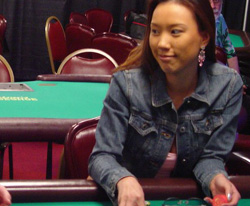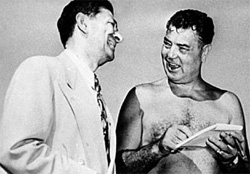June 27, 2005
Feature
Know When to Hold 'Em: A Guide to Televised Poker
| By this point, I am jumping up and down uncontrollably. Burton of course calls and shows his four-of-a-kind. Hensley goes home crying. |
 Evelyn Ng: Not a Dude. |
The final place to go for some good poker schoolin' is the ol' boob tube. What better way to learn the game then from the comfort of your very own living room, where you can watch professionals in their own environment? These days, there is a plethora of programs for your poker enjoyment where you can witness the complete playing-out of hands (thanks to the invention of the lipstick camera, which allows one to easily view players' hole cards), and where you can cringe as you watch a poor soul get suckered to go all in on a hand he is doomed to lose. And unlike sitting through a game with your buddies, due to the joys of editing, you can watch entire tournaments played out in anywhere from one to a couple of hours, with some of the less-interesting hands removed. Plus, it doesn't cost you a dime more than what you're already putting into your cable bill.
So let's say you'd like to start getting in on this televised poker action. Where do you start? Well, what better place than at the beginning ...
 It's all fun and games until the Greek loses his shirt. |
Three years after the first World Series of Poker, Binion participated in an interview in which he stated "We had seven players last year, and this year we had 13. I look to have better than 20 next year. It's even liable to get up to be 50, might get up to be more than that." In 1982, nine years after Binion made this prophetic statement, the tournament drew 52 entrants. In 1987, the number of participants jumped to 2,141. Five years later, the event had grown to a staggering 7,595 participants. The tournament held only 12 events as recently as 1988, mostly Texas Hold 'Em and seven-card stud, but the 2005 tournament now offers 33 competitions that feature a wide variety of games, including Blind Man's Bluff.
There have been many theories on why the World Series of Poker has gained such widespread popularity in recent years, but it is most widely accepted that the WSOP has become such a household name because of the "no-name" amateurs who have snagged the title of World Champion. One of these Cinderella Stories concerns the 2003 champion, Chris Moneymaker. Moneymaker famously won entry to the WSOP from a $39 buy-in satellite minitournament. Moneymaker credits his inspiration to learn poker to the movie Rounders, starring Matt Damon.
| "Painting us all as gun slingin' cheats, crooked casino bosses, and all around thugs isn't the best way of selling the public on the WSOP being a contest of champion poker players." |
This isn't the only inspiration that Rounders has provided to the history of televised poker. The creators of Rounders are responsible for the TV series Tilt, the first to deal with the "all-too-real fantasy world" of Las Vegas poker, shown on ESPN. Set in the month before the World Poker Championships, Tilt follows three professional gamblers who have teamed up to take down the reigning king of the table, Don "the Matador" Everest. The show has met with mixed reviews in general and has been relatively scorned by professional poker players. Daniel Negreneau, who was voted "Player of the Year" at the 2004 World Series of Poker, had this to say about the show: "I was anxious to see the first episode of Tilt and I was pretty shocked to see that ESPN would air a show that won't help their long term goals of promoting a WSOP tour. Painting us all as gun-slingin' cheats, crooked casino bosses and all-around thugs isn't the best way of selling the public on the WSOP being a contest of champion poker players." He has since stated he regrets making a cameo appearance on the show.
Though ESPN currently boasts both the rights to air the World Series of Poker and their own (though lackluster) television series on poker, other entities are jumping on the bandwagon of the growing Texas Hold 'Em popularity. The Travel Channel began airing the World Poker Tour in March of 2003. The World Poker Tour is a series of 15 Texas Hold 'Em tournaments, 12 of which are aired on the Travel Channel. The World Poker Tour also holds a celebrity invitational tournament (more than likely inspired by Bravo's celebrity Texas Hold 'Em series Celebrity Poker Showdown). Although it's a relative newcomer to the poker world, the World Poker Tour is quickly gaining in popularity with strong ratings of more than 900,000 viewers each night and an estimated 1.1 million viewers for the World Poker Tour Championship for the first season. The World Poker Tour is such a success that the Travel Channel has been granted five one-year options to renew its contract with the World Poker Tour. The World Poker Tour is currently filming its 2005 season.
Not to be outdone, network television is beginning to put out their own Texas Hold 'Em-based entertainment. NBC, coming off a poker telecast major ratings success, believes the sport of poker has all the requirements to take its place among television's most-watched competitions. Their Super Bowl Sunday poker tournament telecast, opposite the football pregame show, outdrew an NBA game between the LA Lakers and the Houston Rockets on a competing network. After this success, NBC organized the National Heads-Up Poker Championship, a created-for-TV event which consisted of 64 invited professional players put together in single elimination match-ups similar to the NCAA basketball championship, where 64 teams begin the tournament and play until one champion remains. It was the first televised event of its kind and many in the poker industry believe it to be the prelude to the big four national networks bidding on the rights to televise the World Series of Poker on national TV.
It's an exciting time to be interested in the game of poker, especially if, like me, you're looking for an easy way to start building on your skill base that doesn't lead to thousands of dollars of poker debts. What better way than to watch the cards fall from a comfortable place in your favorite chair, remote in hand, TiVo at the ready? There's no better time to start tuning in than right now. The 2005 World Series of Poker began on June 2 and runs until July 17. ESPN begins its broadcast of The 2005 World Series of Poker beginning July 19. For the official broadcast schedule, visit http://www.worldseriesofpoker.com/broadcast.asp.
Email the author.
All written content © 2005 by the authors. For more information, contact homer@smrt-tv.com
